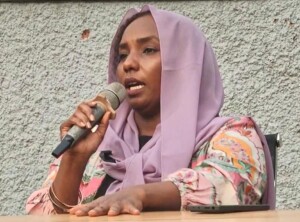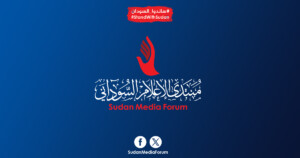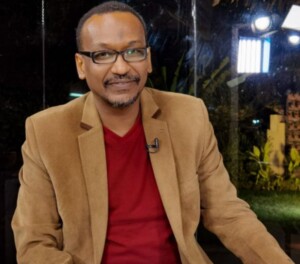Radio Dabanga delegation ends first official visit to Khartoum after 11 years in exile
An enthusiastic crowd of hundreds of people gathered at Khartoum airport on the evening of January 17 to welcome a delegation from Radio Dabanga, led by editor-in-chef Kamal El Sadig, for the first time since the radio station was founded in exile 11 years ago, chanting slogans of the December revolution.
 Radio Dabanga editor-in-chief Kamal El Sadig is welcomed by supporters and listeners at Khartoum airport on arrival on January 17
Radio Dabanga editor-in-chief Kamal El Sadig is welcomed by supporters and listeners at Khartoum airport on arrival on January 17
An enthusiastic crowd of hundreds of people gathered at Khartoum airport on the evening of January 17 to welcome a delegation from Radio Dabanga, led by editor-in-chief Kamal El Sadig, for the first time since the radio station was founded in exile 11 years ago, chanting slogans of the December revolution.
Radio Dabanga was prevented from operating freely and openly in Sudan while the deposed Al Bashir regime was in power, and was founded in exile in Amsterdam, facilitated by the Netherlands-based NGO Free Press Unlimited, and has enjoyed the benefits of the freedom of expression and the press enshrined in Dutch law.
It has taken the changes brought about in the aftermath of the December 2018 that has allowed Radio Dabanga’s editor-in-chief to cautiously venture back into his native country.
On his return to the Radio Dabanga newsdesk in Amsterdam this week, El Sadig said that his visit was important to regain personal contact with the many stringers, contributors, and supporters who have made the radio station’s daily broadcasts of independent news from Sudan and Darfur, and facilitated its grown into a modern multimedia news channel.
He said the visit was also essential in view of the developments in Sudan over the past year, for Radio Dabanga to strengthen connections with its listeners, and asses the news needs of a changing Sudan.
Heroic voices of Radio Dabanga
One of the most important events on the agenda was a celebration at the National Museum in Khartoum on January 22, to meet and honour 23 of the Heroes of Radio Dabanga from various parts of Sudan, of whom 17 are from Darfur.
“These heroic voices represent models of thousands of unknown heroes in various parts of the country who have, for 11 years, been supplying us at Radio Dabanga with accurate, secure, and honest information, and voicing their concerns,” El Sadig says. “They shared the issues, the hopes, and aspirations of their societies on various issues, until Radio Dabanga became the voice of all Sudanese.
‘These heroic voices represent models of thousands of unknown heroes in various parts of the country who have, for 11 years, been supplying us at Radio Dabanga with accurate, secure, and honest information, and voicing their concerns… they shared the issues, the hopes, and aspirations of their societies on various issues, until Radio Dabanga became the voice of all Sudanese'
– Radio Dabanga editor-in-chief Kamal El Sadig’
“The Sudanese who we met with during the two-week visit, from political forces and civil society organisations, women’s and youth representatives, in addition to officials and ministers in the transitional government, all told us that Radio Dabanga has gained a reputation for credibility and independence.”
Sudanese art, artists, and musicians have had an important role in the career of the station. At the Khartoum function, singer Omar Ihsas, the creator of the Radio Dabanga signature tune, and musical jingles for a number of Radio Dabanga programmes, said that “Radio Dabanga raised its credibility and influence to the level at which it became the voice of the voiceless.” Artist Abdelgader Salem praised the honouring of Zubeir from North Kordofan and Salah Mohammedi from Babanusa, in West Kordofan. “It is the first time in the history that people from Kordofan are honoured.”

and Radio Dabanga editor-in-chief Kamal El Sadig (c) at a celebration event
at the National Museum in Khartoum on January 22 to honour the Heroic Voices of Radio Dabanga
At the ceremony, Prof Mohamed El Doma, Chairman of the Darfur Bar Association, Dr Ihsan Fagiri, President of No to Oppression Women, and Dr Mudawi Ibrahim, a prominent human rights defender, assisted in handing the heroes appreciation certificates for their prominent role and congratulating them on the podium.
As an example of public feeling in Sudan towards the contrupution of Radio Dabnaga, the interpreter at the ceremony, Kamal Mohamed El Tayeb, who provided his services free for all the meetings of Radio Dabanga, and provided simultaneous translation for the guests, diplomats and other dignitaries who attended, expressed his sincere appreciation and appreciation on behalf of the Sudanese translators for the role Radio Dabanga has played for 11 years in bringing about change and raise awareness of civil rights in the country.


Dr Mudawi Ibrahim, a prominent human rights defender,
and Dr Ihsan Fagiri, President of No to Conquering Women,
present a certificate to Hero of Radio Dabanga Jaafar Girbir from El Gedaref


Omar Ihsas, creator of the Radio Dabanga signature tune,

and provided simultaneous translation for the guests, diplomats and other dignitaries who attended,
expressed his sincere appreciation and appreciation on behalf of the Sudanese translators
for the role Radio Dabanga has played for 11 years in bringing about change and raise awareness of civil rights in the country.


Radio Dabanga’s editorial independence means that we can continue to provide factual updates about political developments to Sudanese and international actors, educate people about how to avoid outbreaks of infectious diseases, and provide a window to the world for those in all corners of Sudan. Support Radio Dabanga for as little as €2.50, the equivalent of a cup of coffee.












 and then
and then